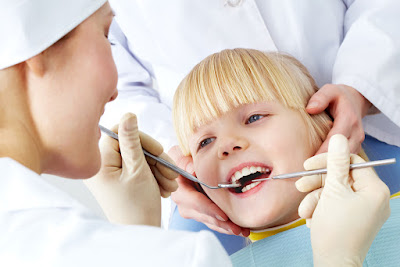Category: cavities
Is Your Child A Good Candidate for Dental Sealants?
The Center for Disease Control and Prevention notes that 70 percent of children will experience cavities in their teeth by the age of 19. If left untreated, these cavities can lead to tooth loss and a lifetime of dental problems. Dental sealants are an option that protects the chewing grooves of the teeth from getting cavities.
Understanding Dental Sealants
A dental sealant is a thin, plastic coating that is applied to chewing surfaces to prevent the tiny grooves and fissures in young teeth from developing cavities. These sealants bond into the small depressions, protecting teeth from bacteria that cause dental caries (cavities). The sealant is applied on teeth after cleaning any food or plaque from it.
The teeth are first roughened (etched) with an acid wash, and then, the sealant is painted onto them. It is then allowed to cure using a curing light. These sealants can last as long as 10 years and will protect the chewing, cheek or tongue surface of the teeth as children grow into young adulthood.
Dental sealants are an underused resource that can help children who have difficulty cleaning back teeth or who are vulnerable to cavities. The surfaces in between the teeth cannot be sealed so flossing is still the best way to protect the teeth from interproximal cavities.
Sealants Go Where Dental Caries Happens
Newly erupted teeth may have many very small grooves and indentations that catch food and may be difficult to clean properly. The teeth at the back of the mouth, in particular, can hold food debris that allows bacteria to thrive.
Sealing the chewing, cheek or tongue surfaces of back teeth ensures that bacteria will not be trapped in these mini crevices. Sealants can be particularly important for children who have thin tooth enamel or a tendency toward developing cavities easily.
Ongoing Preventative Care for Children
Dental sealants should be applied on newly erupted permanent molars and pre-molars. This generally occurs between the ages of 6 and 14. Sealants applied at this time can protect children’s teeth during these cavity-prone mid- childhood years. Dental sealants can be a useful part of preventative care for children’s oral health. They can provide that additional measure of protection against tooth decay that can lead to tooth loss.
Your child can enjoy oral health throughout his or her life if you form good habits early and visit your dentist regularly. Dental sealants can be part of the ongoing care your child needs to maintain an attractive and healthy smile. Call Playtime Dental today to schedule an appointment for your kiddo or if you have any questions!
How to Make Sure Teens are Practicing Good Oral Hygiene

Your teen’s smile enhances their confidence and self-esteem. It’s one of the first things that will attract people to them. That’s why it’s so important to take good care of the teeth starting as soon as possible. Teens lead very busy and active lifestyles, which unfortunately can translate into less time spent on dental hygiene. Following these recommendations will help your teen maintain and sustain quality oral health.
Set a Routine
It is recommended that a person brush at least two to three times per day with a fluoride toothpaste in addition to flossing at least once per day. Over time they’ll get used to the routine. Doing so will help prevent tooth decay, plaque build-up and gum disease.
Diet
Dental plaque loves sugar and carbohydrates. Healthy snacks like fruits and veggies can actually help clean teeth, so encourage your teens to eat smart when it comes to snacking. A diet that’s rich in nutrients is also going to benefit dental health over many years.
Regular Dental Visits
We’re aware that teens maintain an active lifestyle, but routinely seeing a general dentist during the teen years is important for the general development of their teeth and mouth. Just because they saw a kid’s dentist routinely and all of their permanent teeth have come in doesn’t mean that the health of their teeth, gums and bone are optimal. Ignored or untreated dental conditions are going to detract from their overall health and smile, so make sure they get a cleaning every six months.
Piercings
Oral piercings might be popular with kids, but they can chip or break teeth. If your teen is set on it, some piercings are safer than others. We can make our recommendations if needed.
Mouth Guards
Dental injuries occur every year in sports. If your teen is involved in sports, they can prevent dental injuries by wearing a mouth guard. They’re highly recommended and are custom fitted.
Can Cough Syrup Cause Cavities?

It’s well established that both cough drops and cough syrup contain ingredients that can contribute to tooth decay and oral health issues. A child’s teeth are most susceptible to cough syrup, particularly if they use cough medicine and then go to bed without brushing their teeth. The purpose of cough syrup is to coat the throat, but it also coats the teeth.
Sugar, Alcohol and Cavities
Cough syrup usually has a sweet taste because of the sugar in it, but it also often contains citric acid and alcohol. Alcohol can make the mouth dry. Bacteria in the mouth feed on that sugar, and the acid forms around the teeth from the bacteria. Saliva naturally cleans the acid away, but because of the drying effect of alcohol coupled with the naturally diminished production of saliva during sleep, sufficient saliva isn’t produced to clean off the citric acid. That means the acid from the bacteria is left on the teeth for hours resulting in tooth decay.
Cavity Prevention During Cold and Flu Season
If you’re going to give your child cough syrup during cold and flu season, give it to them well before they go to bed and make sure that they brush and floss their teeth before their head hits the pillow. If you have to wait until just before the child goes to bed before taking the cough syrup, have them brush and floss to remove the sugar from the surface of their teeth. Pills or capsules are the best alternatives to liquid cough medicine, and they work just as well so long as your child can swallow pills or capsules.
Tooth decay can cause pain and destroy teeth that you and your kid’s dentist work so hard to maintain. Quality oral health for your kids helps keep your children healthy and reduces the costs of dental care. A little sugar, citric acid and alcohol in a dose of cough syrup might seem insignificant, but it can adversely affect their oral health over time, particularly before bedtime. Follow our cough medication recommendations for the optimal dental care of your child.



